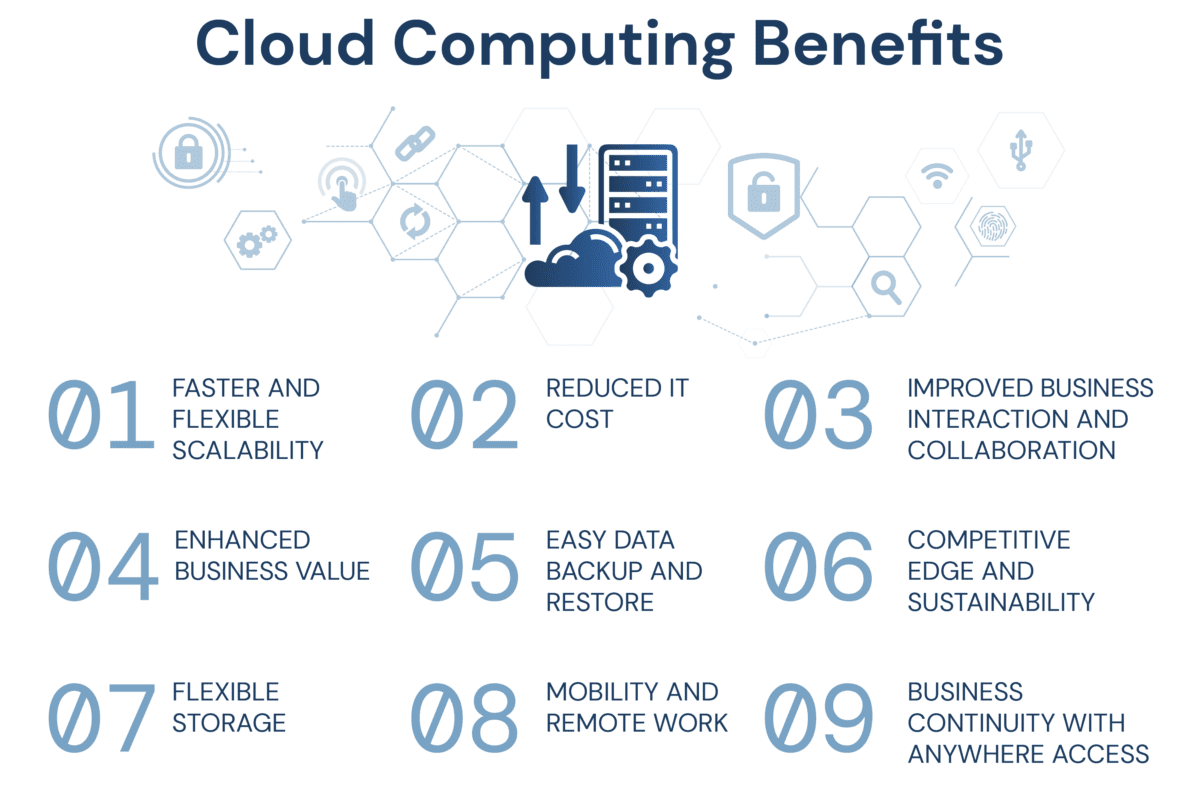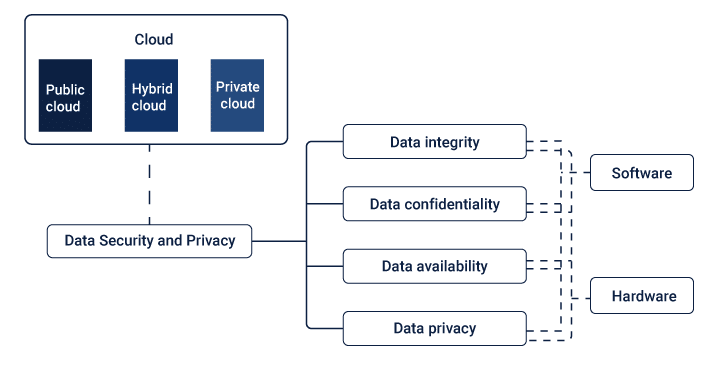
Cloud computing has revolutionized the method through which organizations and individuals gain access to data, applications, and services. It has enabled them to create systems that are more productive, efficient, as well as secure for them to rapidly conform to new market conditions. This blog will assess the various benefits of cloud computing including those about cloud storage, security of data and different types of application software available on clouds.
Efforts shall be made here to explore ways by which companies make use of the cloud so they can save money whilst improving their performance levels and simultaneously ensuring that any relevant information remains protected from unauthorized access or other threats.
Moreover, we shall observe how small businesses along with large enterprises may benefit from such advances presented by utilizing this technology correctly. Therefore readers should pay attention because our upcoming posts regarding this particular subject matter will soon come!
Understanding the basics of cloud computing

Cloud computing is growing in prevalence as one of the most efficient implementations of technology that are available. By gaining knowledge of the fundamentals of cloud computing, businesses have been able to make use of its potency for increasing efficacy, minimising outlay and advancing their workflow procedures.
Generally speaking, cloud computing can be regarded as a mode of stocking data, applications and other assets on distant servers which may be accessed through an internet connection. This allows firms to access their particulars from any place in the globe without needing to sustain physical hardware or software.
The multiple advantages of utilising cloud computing for businesses are widely recognised. It offers them increased scalability, cost-effectiveness and improved flexibility in terms of managing their operations. One particularly appealing feature is its capability to be scaled up quickly when an augmented demand from customers demands extra storage capacity or processing power – thus allowing a more nimble approach as businesses do not have to put money into costly hardware until they know whether there will be a necessity for it sometime down the line.
Furthermore, fees for these sorts of services can easily be paid on a “pay-as-you go” basis which significantly reduces capital expenditure compared with investing in conventional IT infrastructure solutions. Moreover, the data kept on these faraway servers is also extremely secure owing to industry-standard encryption protocols being applied thereto.
Identifying Benefits of Cloud Computing in business operations

Cloud computing has persevered in transforming the way businesses run. By relocating data and applications onto a cloud platform, firms can reduce their outgoings while augmenting expediency and scalability. Therefore, ascertaining the possible advantages of cloud services for business activities is an essential piece of the IT arranging process.
- One paramount advantage of operating with the cloud model is cost diminution. By utilizing this system, companies can pay solely for those services they require without any initial capital expenditure or upkeep outlays linked to running a conventional IT structure.
- Another key advantage of cloud technology is its inherent scalability, enabling businesses to swiftly expand their IT systems when there is a need for an increased customer demand or production output without necessitating investment in further physical infrastructure. This on-demand scaling offers companies greater flexibility to deactivate superfluous resources during periods when the demand is low.
- Furthermore, as their operations evolve or take another direction, cloud computing provides them with the capacity to rapidly attach and detach applications and resources without any extra hardware investments.
- The additional advantages of cloud computing include enhanced data protection and recuperation abilities, as a result of improved security protocols which facilitate the replication of information stored in the cloud to numerous locations simultaneously.
This significantly reduces downtime risk from regional catastrophes such as power cuts or hardware issues. Cloud technology also eases software management by shortening deployment periods; thus making ongoing updates more practical than customary systems. Adopting cloud resolutions provides considerable benefits over conventional means for business operations.
By accessing resources on an ad hoc basis businesses can decrease expenditure while strengthening scalability and dependability within their IT system – qualities that are essential for ensuring lasting success in any industry sector.
Exploring the advantages of Cloud Computing

Cloud computing provides businesses with a plethora of benefits, extending from monetary savings to increased safety and scalability. Investigating the the advantages that cloud computing offers allows one to understand how this technology can enable organisations to meet their digital transformation objectives.
A major plus point associated with using cloud-based services is the simplification it affords in terms of configuring IT infrastructure; rather than having to acquire and keep track of physical servers, companies can rely on virtualisation hosted remotely for all their data needs. The organisation’s costs are reduced by cloud hosting, with the additional flexibility of being able to scale up operations if desired.
Moreover, it eliminates the need for capital expenditure as there is no preliminary cost involved in establishing a virtual server. Additionally, improved security and reliability can also be enjoyed through outsourcing hardware infrastructure to an external service provider; thus allowing companies peace of mind that their data will be kept secure according to industry highest standards.
To sum up, the various advantages of cloud computing are manifold. By making use of this technology, organisations can heighten productivity while lowering overhead costs and thus gain a competitive advantage in today’s digital sphere. Regarding reliability, there is no need to worry about any internal systems going offline due to power outages or similar disturbances – hosting providers will ensure service uptime regardless.
Moreover, as cloud computing services have been designed for scalability purposes, businesses can accelerate their operations promptly when necessitated without having to invest substantially in extra equipment or resources.
The role of cloud storage in data management

Cloud storage services have become increasingly popular due to the convenience and scalability they offer. Companies are allowed to store their data remotely, nullifying any need for expensive on-premises hardware. Furthermore, it ensures that data is securely stored across multiple locations, thus mitigating potential risks such as accidental loss or attack.
Cloud storage also provides businesses with greater flexibility and scalability by enabling them to adjust according to their changing requirements without hurting capital expenditure or operating costs; moreover, this affords quick access and secure sharing of information between stakeholders in an organisation. Consequently, cloud storage plays an integral part when it comes to managing data: providing companies with a reliable yet cost-effective method for large quantities of information addresses while necessitating minimal effort from its users.
Cloud computing and data security enhancements

Cloud computing has revolutionised how businesses store data, providing more efficient and secure alternatives. One of its most valued benefits is the improved security that it offers. The cloud grants organisations control over their data by facilitating easier access to, as well as management of files stored remotely; this also reduces the possibility of unauthorised access due to inadequate physical protection or potential digital breaches.
Moreover, cloud providers make use of advanced encryption strategies which encrypt all information at rest and while being transferred, confirming that only sanctioned personnel can view confidential details. In addition to this many cloud solutions are integrated with Disaster Recovery capacities meaning companies have a speedy method for retrieving lost data when faced with an emergency without experiencing considerable effort or expense – particularly advantageous for those firms who traditionally depend on manual backups or other outdated approaches used to safeguard their records.
By making use of these features corporations can feel confident knowing they are protected from likely risks about their digital assets.
Cloud applications - driving business efficiency
The popularity of cloud applications as a means to drive business efficiency is on the rise. Not only do they facilitate access to the newest available software, but also confer considerable financial benefits in comparison with conventional application delivery systems.
Furthermore, such apps can be deployed immediately and without any perturbation of already existing systems or processes. By making use of these cloud-based solutions rather than traditional premises-housed software options, organisations can present themselves more agilely to changes demanded by customers whilst seizing upon emerging market opportunities at once.
One of the chief advantages that cloud applications offer is improved scalability. This attribute enables companies around the world to become more versatile and efficient in managing their expansion, as organisations expand and add new users or locations due to the secure nature of cloud computing services. Furthermore, IT departments are no longer obligated to expend large amounts of time maintaining and sustaining software versions; thereby liberating valuable resources for additional strategic initiatives.
Another contributory factor to increased operational efficiency is an enhancement in productivity among staff members. Cloud applications provide secure global access, meaning that employees can log on from any device at any location when necessary – enabling them to remain productive regardless of hardware restrictions or intricate setup procedures.
One of the most remunerative advantages offered by cloud computing possibly pertains to its capability for organisations to become slimmer through automation and process advancements. Automated tasks such as storage, backup and archiving can contribute substantially towards reducing time expended on mundane activities while assuring data remains safe all the time – allowing personnel more opportunities for jobs which make direct contributions towards improved enterprise performance.
How cloud computing enhances productivity
Cloud computing has become an increasingly prominent aspect of the IT approaches adopted by numerous businesses. By allowing data to be managed, stored and obtained remotely from essentially any device which is connected to the internet, cloud computing can grant companies the aptitude to make their efficiency and productivity as efficient as possible. Availing of cloud-based solutions allows proprietors of businesses to improve collaboration between teams, refine procedures, enhance resource utilisation and manage costs more advantageously.
There is no necessity to possess a sizeable network of computers or hard drives interrelated when it comes to cloud computing, rather all data is stored on servers based in remote and secure data centres. This obviates the need for organisations to acquire and keep up additional hardware or software, thus drastically cutting down IT infrastructure costs as well as time expended managing systems.
Moreover, this has an extra benefit in that since the data is securely hosted away by a third-party provider, businesses are exempt from worrying about filing physical documents away carefully or spending resources attempting to search out files once they become required.
Utilising modern tools such as virtual desktops and online workspaces, businesses can manage projects more effectively across several locations. This allows for all parties involved in the project – irrespective of their geographical location – access to equivalent information and updates at any given time. Furthermore, cloud-based applications afford employees who operate remotely or travel regularly the opportunity to remain connected without requiring physical entry into their home office or exclusive usage of certain devices.
In conclusion, it is evident that by instituting cloud computing solutions companies can dramatically enhance business productivity via streamlining processes, escalating collaboration between teams and optimising IT infrastructure costs. As an outcome of this companies have greater liberty when focusing on reaching their strategic goals rather than worrying about keeping systems running smoothly.
The economic benefits of transitioning to the cloud
Cloud computing has been adopted with increased velocity in both public and private spheres over the past years, due to its economic advantages. By migrating from physical servers towards cloud technologies, businesses can save capital on material infrastructure charges as well as augment their overall efficacy. From a frugal standpoint, the cloud permits companies to cut down on their preliminary IT allocations along with maintenance and operations outlays.
The cloud also furnishes scalability, meaning enterprises can remunerate for the services they necessitate without having to purchase additional hardware or software when more computing power is required. Moreover, companies can take advantage of the cost-effectiveness of cloud computing by only disbursing for those features which they truly use as opposed to physical servers which require a one-off payment before utilization.
Aside from this benefit in terms of pecuniary cutback, it likewise brings with it increased agility and proficiency that translates into faster time-to-market for new projects. By providing flexible and swift scalability, cloud technologies enable organisations to promptly add or remove capacity depending on their current demands; thus businesses have the capability of effortlessly augmenting or reducing their IT resources whenever needed without needing to go through lengthy procurement procedures associated with physical servers or any other technology solutions located on site.
Furthermore, since most SaaS applications and platforms tend to be dependent upon subscription models, organizations can begin functioning quickly due to not requiring extensive training requirements imposed on employees or facing overhead costs related to information technology projects.
Addressing common viscosities of cloud computing
Cloud computing, in its most rudimentary form, is the provision of computing services – hosted applications, storage and processing power – across the internet. Nevertheless, there are several misconceptions surrounding this technology that ought to be clarified. To begin with, it may appear as if cloud computing is an entirely novel concept; however in reality it has been adopted since more than two decades ago when companies such as IBM and HP first introduced “utility computing” back at the beginning of the 90s. Subsequently, other firms began taking on this technique too.
A further misunderstanding is that cloud computing necessitates specialised hardware or software; however, there exists a variety of vendors who provide offerings for differing degrees of specialization. What is more, those solutions can be exploited on any type and model of computer or device, making it highly convenient. Moreover, some suppliers permit users to deploy cloud-hosted applications whenever they wish with an internet connection. Contrary to the belief that using services implies relinquishing control over them comes misconception number three – this isn’t accurate either.
Utilising the diverse security facilities that are available – such as authentication protocols and data encryption – can give you more control of your data than traditional approaches provide. Another common misconception is that transitioning assets to the cloud will be costly; but, contrarily, it may even work out cheaper than running on-site software due to a decreased requirement for hardware investment and upkeep charges associated with conventional IT structure.
To sum up, debunking these shared misconceptions regarding cloud computing elucidates how advantageous this modern technology can prove when employed appropriately within business activities. Cloud services supply considerable features without necessitating major commitments from businesses in resources or personnel – giving organisations an expedient opportunity to take full advantage of state-of-the-art technologies while still being cost-effective simultaneously.
The Future of businesses with cloud computing
Utilizing cloud computing has had a substantial effect on the functioning of businesses. This innovative technology can offer corporations multiple advantages which are not accessible through traditional means. Through leveraging the cloud, companies may be able to both cut costs and heighten productivity while concurrently having enhanced access to relevant data and applications.
Cloud computing is becoming ever more popular amongst businesses, likely developing into an essential element of numerous organizations in due course. Cloud computing allows for business data to be stored in virtual areas that do not face any physical obstacles. Companies can access a great deal of storage capacity remotely, which grants them the flexibility and scalability to promptly take action in response to varying market trends.
They are not constrained by any physical hardware restraints either, as they have instant access to resources; this enables them to benefit from more effective machines without investing money into extra hardware or software. In addition, due to reduced maintenance duties when dealing with servers, businesses save time and other assets that may be allocated towards something else.
Cloud computing offers numerous advantages, such as improved security due to its dependability and redundancy functionalities that guarantee data is always secure even in the event of an unpredicted breakdown or attack on one server or part of the network. What’s more, cloud services deliver automated backups which make it easier to restore data should anything go wrong along with automatic updates helping keep applications up-to-date while also eliminating manual patching processes. Additionally, businesses take advantage of augmented collaboration between teams resulting from elevated cross-communication among programs.
In conclusion, cloud computing has revolutionized the business environment by providing organizations with a financially sensible way to access potent tools whilst cutting back overhead expenditures related to conventional IT infrastructure management systems. Its versatility, scalability and automation features allow companies to act promptly and proficiently in response to changing market circumstances while ensuring their information remains safeguarded against any assault or disturbance. Consequently, going forward it can be expected that cloud computing will have an ever-growing presence within modern business operations.
In conclusion, cloud computing presents a plethora of advantages for companies both large and small. This technology enables businesses to securely store and manage their data using the power of the cloud, maximise use from powerful applications facilitated by this system as well and benefit from increased agility and scalability. Additionally, it provides an opportunity to save costs on hardware infrastructure investment due to its nature. To summarise, with its numerous benefits that keep organisations competitive within today’s digital environment, no doubt utilising cloud computing has become essential for success across all industries today.
Are you looking to build a career in cloud architecture? If so, then the Cloud Architect Master Programme from ABC is an ideal choice. This programme provides comprehensive training designed to aid individuals in becoming professional cloud architects. Participants of this programme will be offered the chance to learn from industry experts, acquire practical experience and develop skills which are greatly appreciated by employers within the market.
With successful completion of this course, one’s job prospects can be taken up a notch and make them invaluable resources for companies seeking certified cloud architects. Enrol now and join numerous professionals who have already benefitted from such an incredible opportunity!
Are you seeking to advance your skills and knowledge into the 21st century through a career change? Then, Network Kings is offering the perfect opportunity for you in their Cloud Architect Master Program. This accredited program has been specifically designed to provide its students with an essential foundation in cloud architecture and corresponding technologies.
Through employing interactive lectures, and hands-on labs coupled with practical exercises, one would be able to gain proficiency within this field. Sign up today and unlock a realm of possibilities; take the bold step into a modern era by taking part in this cutting-edge profession.
Happy Learning!


